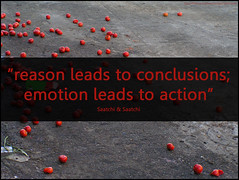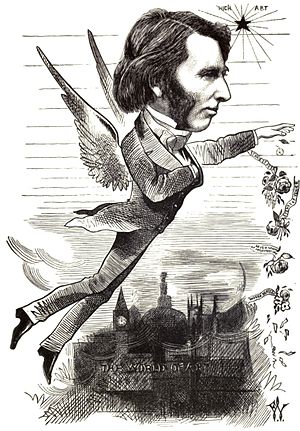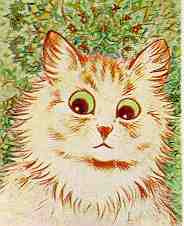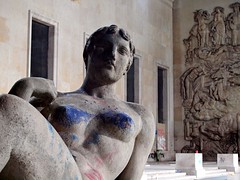I am getting more and more indifferent about the situation of China, good or bad. I seldom read Chinese books, literature or history, almost never watch Chinese TV shows or movies. As matter of fact, I have been like this since I entered this country (USA). In Chinese forums where I participate discussions I have been often accused as "anti-Chinese" or "racist" (my recently short post of 10 favorite books also resented many Chinese fellow netizens simply because none of those books are "Chinese").
I might deserved this label, depend on some superficial understanding of "discrimination", but based on my own understanding, I am not. I am an individualist who is fully capable of differentiating individuals from population, treat each of them individually, regardless their races or nationality. My indifference about "Chinese" is not derived from "hatred", but solely from "personal interest": "Chinese" culture doesn't seem to interest me that much any more.
And there are reasons. It seems to me that thousands years of monotonous "culture" or "civilization", together with "communism" somehow changed, "tamed", even distorted Chinese culture. Among Chinese cultural heritage and contemporary lifestyle, I just don't have a taste of "original humanity".
What is "original humanity"? This is of course a serious subject which deserves a whole hundreds pages of book. But writing (or reading) such book is beyond my current capability (not even mention my back pain), so I would try to appreciate simplicity a little: original humanity can be as simple as "the quality that we possess by nature". Or in other words, it is the quality that has not been stained or "polished" (depend on you view) by so call "cultures", "civilizations", or even "human intelligence" (in a sense of “superior to nature”). Based on this understanding of mine, I found that Chinese culture has been overly “cultivated” so that it lost many natural traits.
Below are several major reasons that I found Chinese culture "anti-original-humanity" (by my own words):
1. Lifelessness: among most of Chinese traditional or contemporary intellectual works (art, literature, etc.), I seldom found any works that praise life for the sake of life itself.
There are many art or literature works praise "Chinese" as a nation, praise her over 4 thousands years of tradition, praise "empire" or communism, but we cannot see many works that show the beauty of human life (or of humanity). Sure there are many art or literature works praised the beauty of nature, expressed the harmony between human and nature, but instead of the direct appreciation of the nature and life, they were more serve as an escape from human world.
The direct reason for this is, by my opinion, that so many Chinese people have been deprived from being capable of enjoying life. Their lives always had/have some preset "purposes", such as serving for their country, their families, parents, their rulers (emperors or communism) , but never, ever for themselves. For lots of Chinese people, life has value only when it is sacrificed. Second, is the religion aspect of Confucianism: "ancestor worship". Such tradition made Chinese people take it for granted that "dead" is more important than "life", parents are entitled to have power over children. This, is
the root reason (cultural wise) of why Chinese culture lacks "life".
2. The worship of man-made order: Confucius was fond of "man-made order", despised passion, inspiration or spontaneousness. This affection to "man-made order" was accepted and followed by most Chinese people, of both ancient or modern time, and it made Chinese culture too "patternized" to be interesting or adventurous. While this trait was already bad enough for art (as matter of fact, I love many type of Chinese art, for their "irrational" characters, but I do dislike its monotonous style), it was absolutely "lethal" in ideology field - it made Chinese people held same idea for thousands years. What can I say except "lazy brain"?
3. The "murder" of individualism: I personally believe that Chinese traditional and contemporary culture (Communism) together have successfully "murdered" "individualism". Or, be more specifically, individualism never existed since Chinese civilization (agricultural) began.
By my poor knowledge of history, I know that one of the major differences agricultural civilization made from the previous civilization (hunting and gathering) was hierarchy system, in which individualism had no room to grow. China, one of the oldest agricultural civilization that is still alive today, is certainly a perfect embodiment of this hierarchy system: from social to family, from art to “science” (the reason I put exclamation mark is I still don’t think Chinese culture has true scientific spirit), literally, you just don't see any clue of "individualism". Or if you saw any - such as Lu Xun, even the classic novel Dream in Red Mansion, those works would almost no exceptionally tottered into the fate of be misinterpreted (“rape” is a more accurate term here) by mainstream intellectuals, serve all different political or social purposes.
By my personal understanding, individualism truly is humanism in its most direct and personal term. However, among Chinese intellectuals (ancient or modern) it has been an issue of the least concern, or not concern at all. That’s why we absolutely found no sense of "self" in almost all intellectual fields. So you may think Chinese people are the most altruist people in the world? Well, ironically, you probably would find it's just opposite (if you have chance to live within Chinese culture long enough), and the reason for this is, (I think) when our decent personal needs are completely deprived, we tend to find some "indecent needs" through "indecent" way, as complementary to this "tremendous loss".
4. Poor intellectual creativity: Lack of individualism inevitably led to lack of creativity. If whole group of people "create" same style of art, state same kind of ideas, we better call these works "products", not "works".
Lu Xun once said, "we better read less Chinese books, or, just not to read them at all" (I cannot agree more!). As Lu Xun, Liu Xiaobo and many other (actually not "many") independent thinkers pointed out, Chinese intellectuals never has been an independent class through Chinese history. Their lack of courage made them always lined up with ruling class. This fact made Chinese intellectual heritage extremely monotonous and insipid.
5. Overwhelming/morbid sadness: There is widespread overwhelming (even morbid) sadness in Chinese art, music and literature, from ancient poetry to modern pop songs. I have been wondered why, but not anymore, because the answer is obvious: the deprivation of "life". Since they (or "we", because even though I am not a Chinese by nationality, nI am still a "Chinese" by "blood") were born, they were "trained" NOT to live for themselves, thus they/we never feel the ownership of their lives. Of course it is sad!
Above are the reasons why I dislike Chinese (main stream) culture. By my opinion, they are all too far away from our original nature, too tamed and "cultivated", not room for change, for freedom.
Of course, I understand any culture has its good and bad sides, and the traits listed above also exist in all cultures, not only in China. But the difference is, in Chinese culture, they are overwhelmingly dominating. And it is exactly this domination that made/makes Chinese culture extremely monotonous and lifeless.
I believe China as a country and political power will not only survive, but also persper due to its economic rising. However, it's mainstream culture - Confucianism, will not be so influential to the world as Chinese economy. As I understand, diversity is the key factor for any organisms to survive, it must be crucial to cultures' survival as well. For this reason, I don't think Confucianism would survive long. As matter of fact, to myself, it already died long time ago.













































